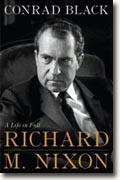Richard M. Nixon
Conrad Black
book reviews:
· general fiction
· chick lit/romance
· sci-fi/fantasy
· graphic novels
· nonfiction
· audio books
· author interviews
· children's books @
curledupkids.com
· DVD reviews @
curledupdvd.com
newsletter
win books
buy online
links
home
for authors
& publishers
for reviewers

 |
Richard M. Nixon: A Life in Full Conrad Black PublicAffairs Hardcover 1152 pages November 2007 |
|
"On April 18 (1973), Nixon told Haldemann to gather up all the tapes and move them to an outside location. On April 9, he had told him that he did not want any preserved record 'of discussions we've had in this room on Watergate.' Finally, Nixon's survival instincts were starting to surface." But by the dates noted by author Conrad Black, mischief was already afoot. The Watergate scandal already had a name and a place in the daily papers. As the drama of Watergate unfolds, Black seeks to warn the protagonist, Richard Milhous Nixon, to whisper as it were offstage:"If he did not move very soon, it would be impossible to disentangle himself from those who had committed felonies." "He could have saved himself…it would have been humiliating but he could have survived it."
Black has exhaustively researched the life of Nixon, the man the American public first loved and then vilified, whose sins have been cited as causing a permanent rent in the fabric of American politics, eroding a people's rightful expectation of morality in high elected office. Named "Tricky Dick" for his campaign tactics while running for Congress in the 1950s, Nixon was never quite able to overcome that image. He gained fame sidewise when accused of maintaining a slush fund for himself while running for vice president alongside Dwight Eisenhower. Eisenhower hedged his bets, letting Nixon speak for himself, and he did so in a speech about his wife's cloth coat and his dog Checkers that, like the nickname, followed him ever after. As Black reckons, "it was maudlin but very effective." Nixon was a bundle of emotional contradictions, belying his obsessive need to plan and control. Congressman Nixon bulldogged the Alger Hiss case, fierce on containing Communism and keeping the Cold War simmering as long as was necessary to accomplish the goal; yet when he was languishing in disgrace in his own country, the Chinese offered to give him asylum. Nixon was an icon of failure to young people who viewed him on the country's first televised debates, squaring off against the probably unbeatably savvy, handsome and well-heeled John Kennedy. By comparison onscreen, Nixon looked dark and dowdy, and he lost. He lost again in a race for governor in California, and any rational person would have figured his political career was finished. But he re-birthed himself, scraping by Hubert Humphrey to win the presidency at last in 1968, by appealing to what he called the "silent majority" of conservative voters. Yet despite his hard-line views and his politics of expediency, once in office Nixon proved to be an international statesman with a flair for detente (a concept he invented) and a domestic politician who brooked no compromise in issues such as desegregation without busing. As president, Nixon had more on his plate from the outset than most officials face in years of public servitude. He was landed in the middle of the Viet Nam conflict (Black calls it "an utterly hopeless war"), the school desegregation conflict, and the Red Scare with its insistent drumbeat of nuclear holocaust as the price to be paid for failure. The youth of America were on the streets, and they didn't like Nixon. Blacks were no longer easily appeased. The author states that despite Watergate and Vietnam, "Nixon achieved as much as any American political leader since Abraham Lincoln...and he did it against his own troublesome anxiety and limitations and awkwardness." Nixon was a desperately insecure man who habitually called his staff to see how he was doing in their estimation, thereby reducing their estimation of him over time. He chose aides who had a nefarious streak mirroring his own, then allowed them to tap into his own dark side. Nixon once declared, "You've got to be a little evil to understand those people out there. You have to have known the dark side of life." This highly revealing portrait of a man more disliked than respected, but more competent and supported than his detractors would like to avow, will raise questions and provoke controversy. Its author has had his own long look at the "dark side of life," and possibly his legal troubles have given him a more than usual sympathy for Nixon, whom, it seems, he would like to have had the chance to counsel, and save. Originally published on Curled Up With A Good Book at www.curledup.com. © Barbara Bamberger Scott, 2007 |
|
|
|
 Click here to learn more about this month's sponsor! |
|
| fiction · sf/f · comic books · nonfiction · audio newsletter · free book contest · buy books online review index · links · · authors & publishers reviewers |
|
| site by ELBO Computing Resources, Inc. | |
 Through it all, Black reminds us, the portraits of the great presidents whom Nixon so admired were "staring down on him, but no clear intent [on Nixon's part] emerges, just a terrible lassitude, and a vacuum where moral sense should have been."
Through it all, Black reminds us, the portraits of the great presidents whom Nixon so admired were "staring down on him, but no clear intent [on Nixon's part] emerges, just a terrible lassitude, and a vacuum where moral sense should have been."